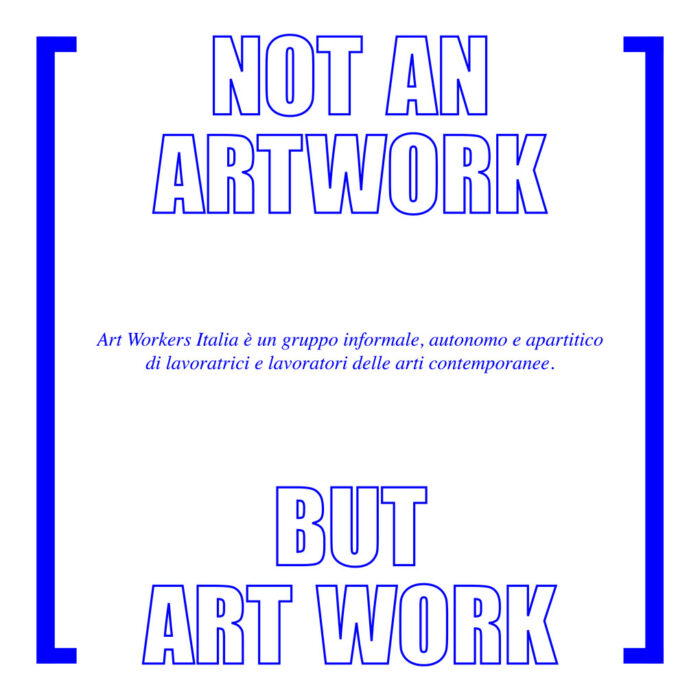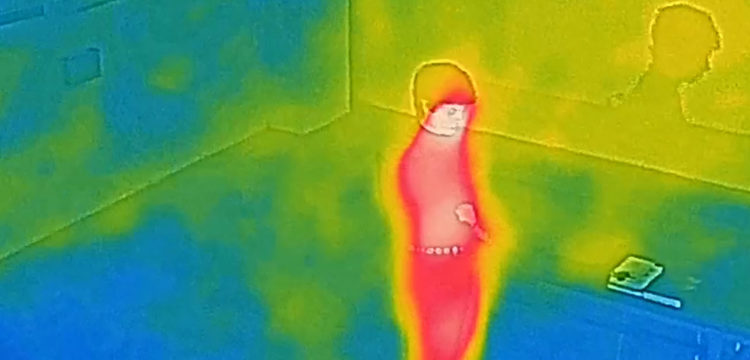To all Art Workers
ART WORKERS ITALIA MANIFESTO
This manifesto was first published in Italian on May 1st, 2020.
Who is AWI
Art Workers Italia is an informal, autonomous, and non-partisan group of contemporary art workers formed in response to the current crisis due to the COVID-19 pandemic.
AWI includes all figures who operate within public and private organisations and institutions for contemporary art—such as museums, foundations, cultural associations, universities , independent spaces, galleries—and/or those who carry out freelance work in collaboration with these organisations. Together, we have convened under AWI to communicate our demands with a single independent voice.
We are art workers: artists, performers, curators, assistant curators, researchers, museum educators, art handlers, producers, lighting and sound technicians, registrars, videomakers, art critics, art writers, art historians, invigilators, couriers, gallery assistants, project managers, consultants, coordinators, conservators, graphic designers, illustrators, photographers, animators, studio assistants, communication and social media managers, and press office staff.
“Art Workers Italia”
The name “Art Workers Italia” underlines our local and transnational perspectives: our analysis of working conditions is informed by the international community of contemporary art workers, while our understanding of workers and their needs is rooted in the historical and political context of Italy, in dialogue with other initiatives supporting precarious cultural work.
Why was AWI founded?
AWI was founded in response to the social and economic crisis caused by the COVID-19 pandemic. For many of us, the crisis has resulted in the suspension and/or loss of jobs and projects. Furthermore, these selfsame employment arrangements have been the reason for exclusion, in most cases, from any form of social safety net or protection envisaged by the government in the “Cura Italia” decree, such as the cash supplement for unemployed workers or one-off bonus paid by INPS (National Institute for Social Security).
The criticality of the situation, amplified by the increase in demand for unpaid digital content during the quarantine by public and private entities, has clearly revealed several structural problems of the sector. The majority of our work is irregular and fragmented, defined by atypical and intermittent contracts, creating an untenable working situation. Furthermore, the lack of protective entities specific to our needs weakens the bargaining power at our disposal. Together with the fact that our wages often neither adequately compensate for the hours and quality of work done, nor the training and experience required, these conditions render our current working circumstances extremely vulnerable.
All of this occurs in a sector in which wages barely above the poverty line coexist with the standards and regulations of the luxury goods industry, where an unacceptable percentage of unofficial and unauthorised work is simultaneously accompanied by high levels of education. It is in this context that, instead of monetary remuneration, alternative forms of “compensation” are imposed, with promises of exposure, networking, and building one’s reputation for the sake of a future (yet uncertain) position. This is supported by an elitist system which complicity incentivises a dynamic of competition and self-exploitation. Ultimately, this situation undermines a healthy working environment based on respect for skills, training, experience, and collaboration.

What does AWI do?
AWI voices multiple perspectives and needs through collaborative and self-directed inquiry, forming a critical mass and advocating for the inalienable right for the recognition of our status as workers, and along with it our subsequent rights and obligations. The organisation is divided into committees, according to different areas of focus, in order to articulate concrete proposals both in response to the ongoing emergency and in the long term.
AWI aims to define, develop, and provide operational tools that provide support concerning ethical, political, legal and contractual nature. Our areas of focus include: strengthening and developing definitive measures of protection; studying the specificities of the non-profit sector; researching historical workers’ struggles in Italy; creating a comparative analysis of good practices already tested in EU and non-EU countries; and identifying and coordinating with other national and international initiatives to protect cognitive labour.
Ethical Principles of AWI
AWI upholds the principles of inclusivity and sustainability as fundamental prerequisites of ethical conduct. We cannot, and we refuse, to discount the necessary solidarity with all workers who are underpaid and exploited. Furthermore, we strive towards a systemic change supporting an egalitarian future for all marginalised identities in respect to gender, ethnicity, class, ability, sexual orientation, religion, age, and nationality.
AWI is not an artistic or curatorial project—rather, it is a non-hierarchical and collective undertaking.
Goals of AWI
Our strategic perspective, in the short and long term, is to focus on the recognition of the profession of contemporary art workers, the regulation of employment relationships, the redistribution of resources, and the reform and restructuring of the entire sector.
Building upon previous efforts undertaken by others, Art Workers Italia is currently working in dialogue with several research institutions, universities, foundations, and cooperatives: to conduct surveys designed to provide quantitative and qualitative information regarding contemporary art workers in Italy; provide training materials for professionals working within the sector; and develop a code of conduct specific to cultural work, that acknowledges its financial and value-extraction operations.
COVID-19 Emergency Requests
Following requests already made by other social and cultural sectors, AWI asks the Italian government for:
- Basic economic support corresponding to the gravity of the situation
- The extension of the measures already outlined in the “Cura Italia” decree to those who do not yet have a social safety net, a condition that affects the majority of the people who work in the sector, as they are subject to intermittent employment contracts or contingent work, and thus reach the minimum days of employment necessary with difficulty
- Confirmation of the appropriations provided by the Ministry for Cultural Heritage and Activities and Tourism regarding projects and events scheduled for 2020-2021 and, where necessary, the reallocation of funds for research and production activities
- Fiscal and tax relief, such as the extension of the 2019 tax balance for the current year; the suspension of advance payment under “Gestione Separata INPS” (Separate Management INPS) for self-employed workers, whether as a lump sum or otherwise; the suspension of Synthetic Indices of Tax Reliability (ISA); and finally, the lessening of rents—through tax credit—for non-profit associations and other premises used for artistic production (including artists studios)
- A policy addressing the compensation of digital and online art production
Long-term Goals
Together with various institutions and entities, AWI will work towards the long-term goals concerning the following macro-themes: worker protection, the establishment of designated funds, and the reassessment of a system of increased competition and professionalisation. We aim to create an overarching organisation that can connect a constellation of individuals and associations, representing their collective needs and demands within the public sphere.
These include:
- Developing a professional charter for those working in the contemporary arts, modelled after the National Chart of Museum professions (2006);
- Identifying key points in the current legislation applicable to contractual employee positions; developing legal forms that more accurately reflect current working situations, with the intent of proposing one or more drafts for future models of national contracts relevant to the different roles within the field of contemporary art
- Creating new ATECO codes (Italian Classification of Economic Activity), or revising pre-existing ATECO codes, for independent contractors to adequately address more specific needs and extend to them legal protection such as unemployment benefits, sick leave, maternity leave, and parental leave
- Proposing fair compensation for services rendered by artists and arts professionals (such as exhibitions, performances, public conferences, workshops, screenings, reproductions for commercial and non-commercial use, exhibition installation, curation, etc.), in addition to promoting and monitoring the widespread use of these standards
- Requesting the Italian government to adhere by guidelines such as the “Social Status of Artists” European Parliament resolution of 7 June 2007 on the social status of artists 2006/2249(INI) and their subsequent updates that take into consideration existing industry needs;
- Enabling access to designated funds in Europe dedicated to the production and acquisition of artworks, artistic training, and professional research and development, to be available regionally and nationally
- Proposing the establishment of a fund for visual artists by expanding upon the pre-existing INPS PSMSAD (Fund for Painters, Sculptors, Musicians, Writers and Dramatic Authors)
- Calling for funding to be more transparent, inclusive, and reflective of current practices of cultural production, as well as arts education, by restructuring the current system of open calls and grants. To this end, we ask for public funding to be conditional upon the fair remuneration of all the artists and professionals involved
- Expanding the number of entities and activities who can benefit from patronage—such as Art Bonus—and provide additional tax breaks for donations made to support contemporary art
- Facilitating sponsorship in contemporary art by bridging the information gap between possible sponsors and sponsees
- Promoting professional development for artists, artistic studies, and the role of education in contemporary art in the education system in Italy
Conclusion
Contemporary art workers operate at all levels of national and international cultural production, in both breadth and depth. Collectively, the sector does not only impact the social cohesion of a community but also its intellectual and civic growth, carrying significant economic repercussions across the country.
This manifesto represents the first step away from an unjustifiable and unacceptable condition of invisibility, towards the goal of full civil and political recognition that takes into account the fundamental role, and its specificities, that contemporary art professionals occupy within the larger sphere of local and global cultural production.



